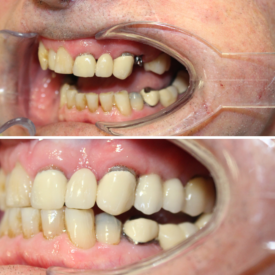Who Needs a Dental Bridge?
If you have lost teeth due to injury, decay, or gum disease then you are a good candidate for a dental bridge. We will determine whether a bridge is right for you based on a number of factors, including the location of the missing tooth or teeth, the health of the adjacent teeth, and your biting and chewing patterns.
In some cases, a removable partial denture or implants may be recommended instead. The best way to determine if a bridge is right for you is to schedule a consultation with us.
What’s the Procedure for a Dental Bridge?
The patient will be given a local anesthetic to numb the area before the procedure begins. The dentist will then prepare the tooth by removing any decay and shaping the tooth to make room for the bridge.
An impression will be made of the prepared tooth and sent to the laboratory. The laboratory will use the impression to create the bridge, which will be made to match the shape, size and color of the patient’s teeth. The bridge will be cemented in place at the final appointment.
Benefits of Dental Bridges
- If you have one or more missing teeth, a bridge can help prevent your remaining teeth from shifting out of place and improve your chewing and speaking abilities.
- Bridges can restore the natural contours of your face and improve your appearance.
- You also get the added advantage of improved oral health and a restored smile.
- Bridges are also an improvement over traditional dentures in many ways. They look and feel more like natural teeth, and they are much more stable.
- Bridges are also easier to care for than dentures, and they last longer.
Pricing
You will be provided with an estimate at your initial appointment but it is generally assumed to be around £400 per unit.
How long does it take?
The treatment will require at least three visits and will usually be completed in a month from start to finish.
How to Take Care of Dental Bridges
Like all dental procedures, dental bridges require special care to keep them clean and in good condition. Here are some tips for taking care of your dental bridge:
- Brush your teeth twice a day with a soft-bristled toothbrush and fluoride toothpaste.
- Use floss threaders or interdental brushes to clean under your dental bridge.
- Rinse your mouth with water after eating.
- See your dentist regularly for checkups and professional cleaning.
FAQs
How long does a dental bridge last?
The average lifespan of a dental bridge depends on the type of bridge, material used, and how well it is cared for. The most common type of dental bridge, the fixed bridge, made of ceramic or porcelain fused to metal, can last up to 10 years with proper care.
Does an implant-supported bridge require surgery?
No, an implant-supported bridge does not require surgery. The implants are placed in the jawbone and the bridge is attached to the implants. It is a less invasive option than a traditional bridge.
Can dental bridges be whitened?
Yes, dental bridges can be whitened; however, it is important to note that not all dental bridges are made of materials that can be safely bleached. If your bridge is made of porcelain, you can have it professionally whitened or use at-home bleaching kits designed for porcelain teeth. If your bridge is not made of porcelain, please consult our dentists to discuss whitening options.
Are dental bridges painful?
While some people may experience some discomfort after having a dental bridge placed, it is generally not a painful procedure. Our dentists will numb the area around your teeth before placing the dental bridge, so you should only feel pressure during the procedure.










